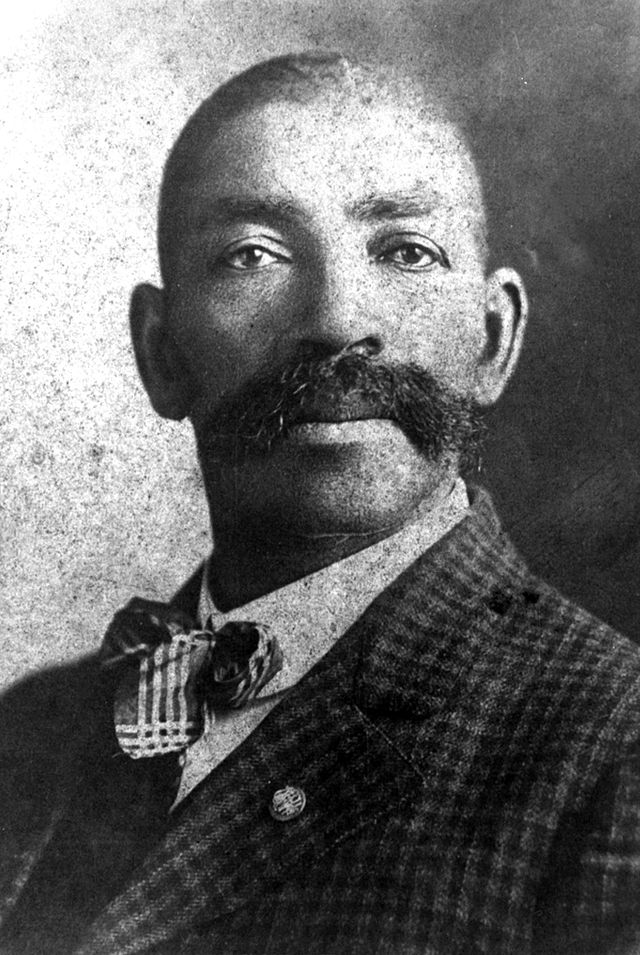Bass Reeves: Difference between revisions - Wikipedia
 Article Images
Article Images
Tags: Mobile edit Mobile web edit Advanced mobile edit
Line 35:
'''Bass Reeves''' (July 1838 – January 12, 1910) was a runaway slave, gunfighter, farmer, scout, tracker, and deputy [[U.S. Marshal]]. He spoke several languages including [[Cherokee language|Cherokee]] and [[Muscogee language|Creek]]. Bass was one of the first African-American deputy U.S. Marshals west of the Mississippi River mostly working in the rough Indian Territory. The region was saturated with horse thieves, cattle rustlers, gunslingers, bandits, swindlers, and murderers. Bass made more than 3,000 arrests in his lifetime, only killing fourteen men in the line of duty.<ref name="Parkservice">{{cite web|url=https://www.nps.gov/fosm/learn/historyculture/bass_reeves.htm|title= Bass Reeves|author= Art T. Burton|date=April 10, 2015|publisher= National Park Service|location=Fort Smith, Arkansas |access-date= February 2, 2024|url-status=live|archive-url=https://web.archive.org/web/20230912234036/https://www.nps.gov/fosm/learn/historyculture/bass_reeves.htm|archive-date= September 12, 2023}}</ref>{{sfn|Burton|2006|pp=21-22}}
Bass was born into slavery in [[Crawford County, Arkansas]]. His family were slaves belonging to Arkansas state legislator William Steele Reeves. During the American Civil War, his owners fought for the Confederacy. At some point, Bass escaped and fled to Indian country where he learned American Indian languages, customs, and tracking skills. He eventually became a farmer. By 1875, Bass was hired as a deputy U.S. Marshal along with 200 other individuals. He was 37 years old. Bass was well acquainted with the Indian territory and served on their land for over 32 years as a peace officer covering over 75,000 square miles, presently known as Oklahoma. He was a victim of several tragedies during his lifetime. He accidentally shot a man which led to the court case ''United States vs. Bass Reeves'' for which he was acquitted, his first wife Nellie Jennie died in 1896 and he had to arrest his son Benjamin "Bennie" Reeves who was charged with murder.{{sfn|Thompson|2023|pp=34}} His son was released after eleven years in prison and lived out the rest of his life as a model citizen.<ref name="Oklahoma Historical Society">{{cite web|title= The Encyclopedia of Oklahoma History and Culture|website=okhistory.org|url= https://www.okhistory.org/publications/enc/entry.php?entry=RE020|access-date=February 2, 2024|url-status=live|archive-url=https://web.archive.org/web/20240123095424/https://www.okhistory.org/publications/enc/entry.php?entry=RE020|archive-date=January 23, 2024}}</ref><ref name="Encyclopedia Britannica">{{cite web| title= Encyclopedia Britannica | website= britannica.com | url= https://www.britannica.com/biography/Bass-Reeves |access-date=February 2, 2024|url-status=live|archive-url=https://web.archive.org/web/20240117144051/https://www.britannica.com/biography/Bass-Reeves|archive-date= January 17, 2024}}</ref>{{efn|Indian Territory comprised most of what became Eastern Oklahoma on November 16, 1907, when Oklahoma became a state. Reeves's former position as a deputy U.S. marshal was abolished at that time, so he became an officer with the Muskogee Police Department, where he served for two years until he was forced to resign because of his declining health.}}
Bass encountered some of the most ruthless outlaws of his day. His weapons of choice were the [[Winchester rifle|Winchester Models]] 1873 and 1892. They were guns that conveniently fit dual-purpose handgun/rifle cartridges. He also briefly used the Colt 45 peacemaker.<ref name="Americanrifleman">{{cite web| title= Frontier Lawman: Deputy U.S. Marshal Bass Reeves|author= Jim Wilson| website= americanrifleman.org/|date= February 12, 2015| url= https://www.americanrifleman.org/content/frontier-lawman-deputy-u-s-marshal-bass-reeves/ |access-date=February 2, 2024|url-status=live|archive-url=https://web.archive.org/web/20230131001117/https://www.americanrifleman.org/content/frontier-lawman-deputy-u-s-marshal-bass-reeves/|archive-date= January 31, 2023}}</ref> He tracked and killed notorious outlaw Jim Webb. Webb murdered over eleven people.<ref>{{cite book|last= Nelson|first=Vaunda Micheaux|title=Bad News for Outlaws The Remarkable Life of Bass Reeves, Deputy U.S. Marshal|url=https://www.google.com/books/edition/Bad_News_for_Outlaws/vmdXBAAAQBAJ?hl=en&gbpv=1&dq=The+Legacy+of+Bass+Reeves:+Deputy+United+States+Marshal&printsec=frontcover|year=2013|publisher=Lerner Publishing Group|location=: Minneapolis, MN|isbn= 9781467737593 |pages=intro}}</ref> Another notorious desperado Bass encountered was murderer and horse thief Wiley Bear. Bass rounded him up along with his gang which included John Simmons and Sam Lasly. Bass was also in a gunfight with the Creek desperado Frank Buck whom he shot and killed.{{sfn|Thompson|2023|pp=34}} Bass was immortalized in the popular media including TV shows, films, novels, poems, and books. He was also inducted into the [[Texas Trail of Fame]].<ref name="Texas Trail of Fame">{{cite web| title= Texas Trail of Fame | website= texastrailoffame.org | url= https://www.texastrailoffame.org/inductees/bass-reeves |access-date=February 2, 2024|url-status=live|archive-url=https://web.archive.org/web/20231118212002/https://www.texastrailoffame.org/inductees/bass-reeves|archive-date= November 18, 2023}}</ref> A bronze statue of Reeves was erected in Pendergraft Park in Fort Smith, Arkansas and the Bass Reeves Memorial Bridge in Oklahoma, was named after the legendary lawman.<ref name="Encyclopedia of Arkansas">{{cite web| title= Encyclopedia of Arkansas|author= Art T. Burton| website= encyclopediaofarkansas.net|url=https://encyclopediaofarkansas.net/entries/bass-reeves-1747/|date=November 17, 2023|access-date=February 2, 2024|url-status=live|archive-url=http://web.archive.org/web/20231222165346/https://encyclopediaofarkansas.net/entries/bass-reeves-1747/|archive-date= December 22, 2023}}</ref>